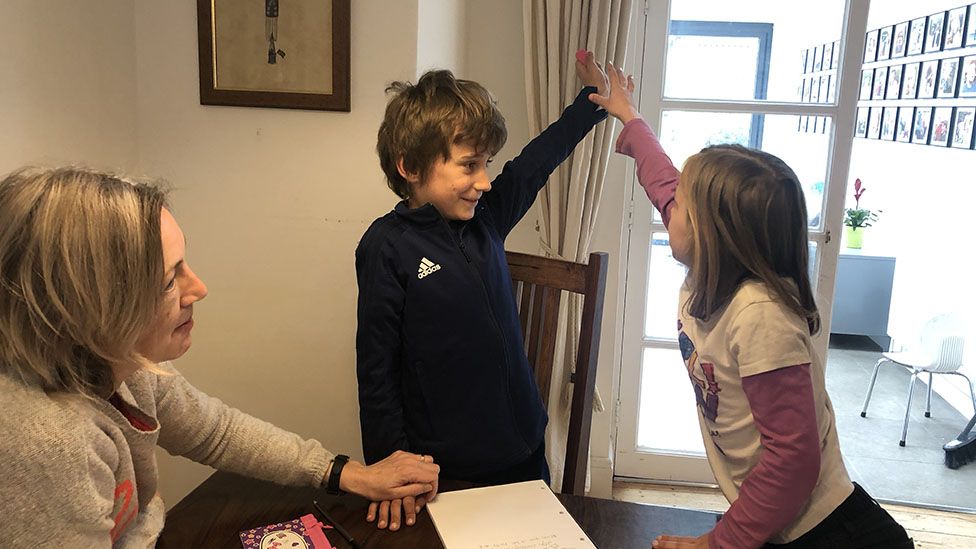Coronavirus: The impossibility of home-schooling a nation
- Published

When UK schools closed their doors amid the coronavirus crisis a couple of weeks ago, a second - and for some, horrifying - epidemic started to spread: that of home schooling.
Children returned home laden with homework packs or, in some cases, full online timetables and parents made uneasy transitions into teachers of maths, English and science.
Feelings of incompetence machine-gunned kitchen tables - ricocheting into darkly comic social media posts.
Messages like, "if you see my children picking weeds and crying in the garden, they're on a field trip", received thousands of likes.
Some, lucky enough to be able to work from home, set about scheduling their jobs around the demands of their children's education. But as we reach the Easter holidays, many will be wondering: how long can I keep this up?
Allow Twitter content?
This article contains content provided by Twitter. We ask for your permission before anything is loaded, as they may be using cookies and other technologies. You may want to read Twitter’s cookie policy, external and privacy policy, external before accepting. To view this content choose ‘accept and continue’.
Mother-of-three Laura Hughes says she abandoned her ambitious timetable a week-and-a-half into lockdown.
"I had rather naively hoped that I could get the younger two to work through a page or two of their home-learning packs with minimal supervision, allowing me to read or reply to a few work emails," she said. "The reality has been somewhat different."
Although her 11-year-old daughter has been able to work independently, it has been nearly impossible with her seven-year-old twins.
"I spend more time refereeing squabbles and pulling them apart when they fight, than doing schoolwork with them," she lamented. "Staying calm when they are all running amok or point-blank refusing to open their books is the biggest challenge."
They've now moved to a much looser routine of a few basics.
Allow Twitter content?
This article contains content provided by Twitter. We ask for your permission before anything is loaded, as they may be using cookies and other technologies. You may want to read Twitter’s cookie policy, external and privacy policy, external before accepting. To view this content choose ‘accept and continue’.
Cleo Thomas, is supporting parents of toddlers and babies, while trying to get her 15-year-old son, Kalyan, to rise at the same time each day, eat breakfast and do at least some work.
"The school is still setting homework. If he does it, it's the bare minimum of five to 10 minutes. But the school wants more than that and it's really hard to get them to realise that they have to continue.
"I have medical issues, and I don't want to scream and start to get angry. It raises my blood pressure and makes me more likely to get ill. He's going to be in the GCSE stream for next year and I really feel for them - when they do do back to school they're going to have to start catching up."
Allow Twitter content?
This article contains content provided by Twitter. We ask for your permission before anything is loaded, as they may be using cookies and other technologies. You may want to read Twitter’s cookie policy, external and privacy policy, external before accepting. To view this content choose ‘accept and continue’.
By the fifth day of England's lockdown, teachers and heads had already had enough. The main teaching unions put out some common-sense guidance stressing saying it was not "business as usual" for schools - or parents.
How much should you be doing?
"Children can't be expected to be able to study full-time with online resources," National Education Union joint-general secretary Mary Bousted said.
"Similarly, parents - many of whom will also be working from home - cannot be expected to be supervising heavy school workloads for their children."
Many schools have since adopted sensible approaches, she says, but others have not.
"It is essential that heads ensure neither staff, pupils or parents are overwhelmed and confused by unrealistic expectations."
The joint-guidance recommends no more than three hours' work a day.
For some, who are able to be at home with children, that might be a relief. For others, who return late from a shift in a supermarket or hospital, three hours may seem like an impossibility.
"This isn't about parents replacing the teacher," says Professor Becky Francis, a big player in education and academia.
"It's about encouraging parents to help their children create regular routines and study habits."
It's well-known in teaching circles that pupils slip back over the summer holidays, so its understandable that teachers and parents will want to limit that by encouraging work at home.
But Prof Francis says poor children tend to be most affected academically by being out of school.
She is pretty certain that any gaps in achievement between richer pupils, will be widened as a result of the school shut down.
Carrie Adamson, a Manchester Metropolitan University PhD student who is studying home schooling, points out all children are now out of school.
Some young people may be left alone or with other siblings looking after them, she says, adding that it's not fair for parent working hard or worrying about sick friends to be expected to take on schooling responsibilities too.
"Not everybody has access to a periodic table jigsaw, bulging bookshelves and craft materials," she says.
What happens when lockdown ends?
Some head teachers have called for schools to be able to make up for lost time, by repeating the summer term.
Head of the Association of School and College Leaders Geoff Barton thinks there could be a push for a "fresh start".
"This is going to need something of a national renewal. We'll want something pretty substantial to re-establish patterns of learning, habits of schooling, the resocialisation of the UK's young people."
And that will probably be true for parents too.